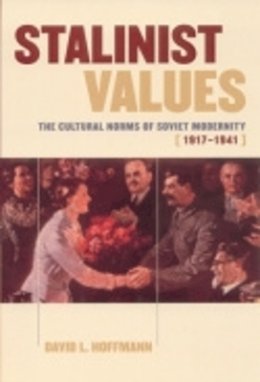
Stalinist Values: The Cultural Norms of Soviet Modernity, 1917–1941
David L. Hoffmann
Soviet official culture underwent a dramatic shift in the mid-1930s, when Stalin and his fellow leaders began to promote conventional norms, patriarchal families, tsarist heroes, and Russian literary classics. For Leon Trotsky—and many later commentators—this apparent embrace of bourgeois values marked a betrayal of the October Revolution and a retreat from socialism. In the first book to address these developments fully, David L. Hoffmann argues that, far from reversing direction, the Stalinist leadership remained committed to remaking both individuals and society—and used selected elements of traditional culture to bolster the socialist order. Melding original archival research with new scholarship in the field, Hoffmann describes Soviet cultural and behavioral norms in such areas as leisure activities, social hygiene, family life, and sexuality. He demonstrates that the Soviet state's campaign to effect social improvement by intervening in the lives of its citizens was not unique but echoed the efforts of other European governments, both fascist and liberal, in the interwar period. Indeed, in Europe, America, and Stalin's Russia, governments sought to inculcate many of the same values—from order and efficiency to sobriety and literacy. For Hoffmann, what remains distinctive about the Soviet case is the collectivist orientation of official culture and the degree of coercion the state applied to pursue its goals.
Product Details
About David L. Hoffmann
Reviews for Stalinist Values: The Cultural Norms of Soviet Modernity, 1917–1941
Library Journal
Hoffmann provides a new cultural framework for understanding Soviet history during the interwar period.... Hoffmann argues that the Stalinist state neither 'betrayed' the socialist revolutionary nor 'retreated' to traditional Russian mores. Instead he shows that the Stalinist order, like other European post-Enlightenment states, sought to catalogue, mobilize, and shape its citizens into ideal men and women. Defining modernity as the rise of the interventionist state and the birth of mass politics, Hoffmann details the various ways that the Soviet state tried to enlighten and transform human nature in their quest to create an ideal socialist order.... This book will force us to think about the wider international implications of Stalinism. The writing is a model of clarity, and the text can be used at both the graduate and undergraduate levels.
Choi Chatterjee
American Historical Review
Using a variety of sources, including the Russian archives, the author has written a brilliant description of Stalinist values and proved that Stalin was an ideologue to the end. He shows that the ideology failed precisely because it was an ideology—out of touch with reality and people. Summing Up: Highly recommended. Upper-division undergraduates and above.
Choice
